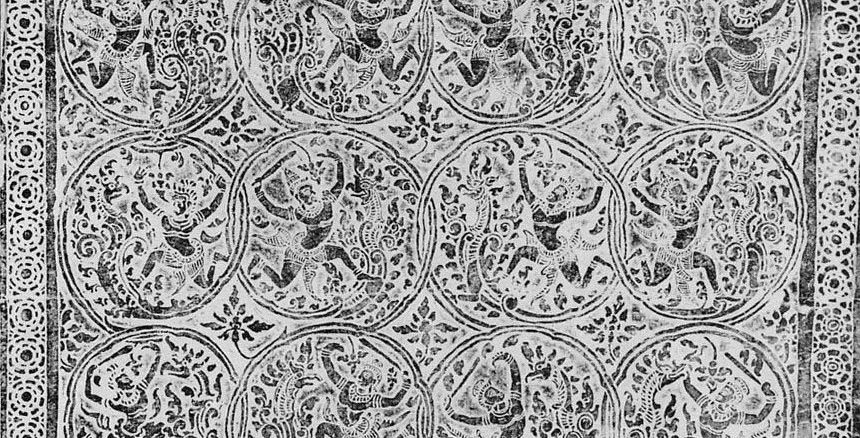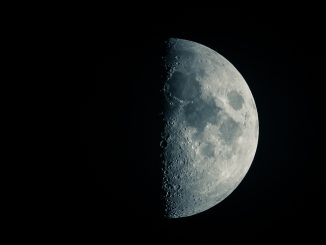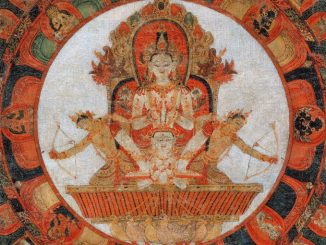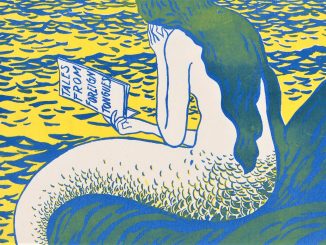
In a letter to her daughter she put up for adoption, Holly Pelesky muddles through the emotional distance from her own mother who tried to leave her father once. An exploration of the tension between mothers and daughters; a reflection on how the choices we make wedge space between us.
For my daughter, adopted.
There is something I don’t know about mothers and daughters—something I don’t understand.
I am twelve. I’m on a swing, clutching the chains with each fist and I am pumping my feet outinoutin-out-in-out-in-ouuut—innnn—ouuut—innnn so I can reach higher, higher, higher.
Someone once warned me, maybe it was my mother, about a kid who swung so high he flipped himself over the bar, knocked his teeth out when he hit the ground, landed in a splat. This story is supposed to scare me into safety, but it is an aspiration now: to be a kid who swung so high she passed over.
The kid without the teeth has a story to tell, at least. Not like me, this home-schooled kid in Suburbia where nothing interesting ever happens. Paint just dries.
My own mother had her two front teeth knocked out by swinging monkey bars when she was ten. The fake ones she wears have turned black at the edges where they meet her gums. Two depressions adorn her knees, scabbed many decades over and over. I look at her scars in admiration, imagine them back when they were wounds still, back when she was a child I think I would’ve liked to know.
I don’t know what she was like at ten, but I’ve seen a picture of her at sixteen when she was the beauty queen in her little town. She rode in the parade atop the rear of a convertible, waving delicately, chastely, in a tight short dress. I love this picture of her when she was someone else: someone before Avon Christmas sweatshirts, before she was someone who only asked for spatulas for Christmas.
She used to sew and make pies for the fair. She won blue ribbons in 4-H for the incredible wife she would inevitably become (it wasn’t called that but it could’ve been). They were bred for breeding, those farmers’ daughters, the ones who knew that mouths needed feeding, bodies needed clothing; the girls who milked cows and hoed strawberry rows, but knew nothing about crafting careers and following desires.
On my father’s birthday, we take a mixing bowl out back and fill it with blackberries. Careful where you step, hold the thorny branches just so. We bring back the mixing bowl and Mom fills a pie, then sends us to the backyard with the leftover berries and a bowl of sugar to dip them in. The bees come, first one, then six, then a dozen, and we run away, shrieking, leaving behind our bounty.
When my mother was a teenager, she was a model. She tells me how they would line up against a wall. They were supposed to flatten their bodies completely, that’s what models looked like: straight lines. She was “sway-backed.” That’s what they called it, meaning she had an ass before asses were popular. She asked her father for a butt reduction, but he said one day you’ll be glad for it, people will want a curve like yours. Her body was an upside-down question mark, not like the others: exclamation points minus the excitement.
What I know of my mom now that she is a wife and a mother is this: she sits in this large green checkered chair, a brown stripe on the back from hair products, and she scratches her head and reads the newspaper. She doesn’t scratch at an itch, she scrapes her scalp with her fingernails, drawing up white reside she later picks out of her nail beds with a straight pin. It drives me crazy, her scratching, even the way she reads the newspaper. She reads the sports page although she has no interest in sports, the business section, all of the boring stuff.
“Why do you read what doesn’t interest you?” I asked, and she said she should know what she isn’t interested in, to be well-rounded. Like a husband and four kids? I think but don’t say.
We don’t tell dad that while he is at work educating kids she sleeps until nine, and we’re not allowed to wake her before then. When she is awake, if it’s sunny, she lies on her Minnie Mouse beach towel, lathered in baby oil, from eleven to two, when the best sun is. She is so tan she doesn’t look related to us. She barely eats, which worries me. Occasionally I see her eating a rice cake and I want to add a slice of cheese to it.
She was born into this life, but she doesn’t belong here. She belongs on the back of a convertible, waving from a distance at people who admire her without knowing her.
That’s the girl I want to know, the one I don’t know at all, but feel I could understand, the girl who was blunt enough to ask her father for a butt reduction, a courage I could never muster, an honesty I was chasing.
No matter how hard I try, I cannot flip my swing over the bar. My teeth stay intact. I can’t find my story.
I am my mother’s daughter and what I don’t understand about mothers and daughters is how we are separate bodies but somehow, turn out so much the same, despite our best efforts.
Our mothers’ lives are self-fulfilling prophecies of our own future selves or they aren’t, but the similarities are startling, how we laugh loudly, how our eyes crinkle, how we chase what we wanted or we resign ourselves to what we didn’t.
I am thirty-four now. Here is something new I know about my mother: before I was born, she left my father. She moved back to her parents’ home, with my older brother, age two. While I grew inside of her, she worked in her uncle’s convenience store, eking out a life that was meager, but her own. I picture her stocking cookies on a shelf, the sandwich cookies she called “beach cookies’ because her mother always bought them on the way to the beach. I picture her, thinking of the beach, the place she loves more than anywhere else.
Maybe it’s the cool ocean air, the way it smells, how it hangs low and sure, clinging to her skin, becoming her. Maybe it’s the sand between her toes, the gritty earth. Probably, her family who accompanied her to the beach when she was young and they were a part of her and she a part of them, before she married dad and moved to a place that wasn’t home (Gracie, you must see our similarities, me and her).
Probably that is it: the her-ness she had once, on the beach, before she became a wife and then a mother, fulfilling needs beside her own.
But you know how this goes.
I grew and she swelled and then one day in March she felt labor pains and called my dad because she had to. I was half his. What kind of person wouldn’t tell her husband that his daughter is being born? My dad showed up at the hospital. I have a picture of Mom holding me, my dad leaning over the hospital bed at an awkward angle, expendable. But he wasn’t inessential, as the picture suggests. Over the past few months my mom realized she couldn’t do it: raise two small children on a convenience store salary. She returned to my father’s home, with my brother in tow, me wrapped in a pink receiving blanket. She cemented her life with him and never tried to leave again. I am the daughter who forced her back to him, away from herself and her beach cookies, away from her family—and into his where she never felt at home.
What I know now is that I am not the black sheep of the family because of you. I got pregnant and brought shame on my Christian family, sure. How could anyone look at me the same way, knowing I’m an animal with sexual desires, one who doesn’t even think to use protection? What a whore, what a slut, what a godless creature I am. But much before you, Grace, I was different from my brothers, my sister. I was the one who trapped my mother. I am not the black sheep as much as I am cement shoes. I always felt the weight of myself. I knew I was the slump in my mother’s shoulders by how she talked about me, exasperated.
I’ve asked my mother about her own mother and she didn’t say much, just said, “She was really good at doing things with the girls in the 4-H club.” Then she was quiet and I read into the space what she left unsaid. I remembered Mom saying she won 4-H ribbons for her sewing and cooking. I thought about my church ribbons and cringed. The two of us, confusing accolades for affection. Thinking we can earn love; that it’s like gaining respect. We are perpetuating love in the way we learned it.
I never wanted a daughter. I know that sounds harsh and I cringe to write this to you. I’m having a physical reaction to these words. I’m squinting, so I don’t have to see them fully. But I couldn’t shoulder reading in my daughter’s diary one day, “I HATE MOM!” in all caps, the words my mom read in mine. I didn’t want to live with the bad blood a mother and a daughter share. I didn’t think that I was strong enough for it. I could not bear what I can’t understand about mothers and daughters, how we resent each other for being alike.
When I was a kid, I knew if I had children, I would only want boys. My sister and I would giggle into the nights, writing each other futures (a yellow house with a gingerbread trim, a chocolate lab). She learned to write me with two boys, because if she didn’t I would ball up the paper she wrote it on and insist she write me a new one.
So, when I was pregnant with you, an obstetrician asked if I wanted to find out your gender. I was pretty close to sure I would place you for adoption, but I hadn’t committed yet. I wanted to find out that you were a girl first. I thought it would make it easier to give you away. I laid there on that crinkly examination room paper, clear jelly smeared over my large belly while a woman pressed a wand over it, searching for a picture of you on the screen. You came into view: grainy, black and white. A lump compounded in my throat the size of your fist when I saw you. No matter what gender, you were mine, and there you were, a giant head and a small body, the way I had been once when my mom stocked shelves.
“Are you ready?” the ultrasound technician said, and I nodded because I couldn’t form a word, but the nod was a lie. I wasn’t ready, I wouldn’t ever be. I would never be ready for a baby, probably, but certainly wasn’t then. I was not prepared to be a mother to you or to anyone. I was still figuring out how to detach from my own mother, how to live on my own like an adult: without blacking out or getting knocked up.
“It’s a girl!” she said with enthusiasm.
Relief did not wash over me. Instead, a tear dropped from my eye onto that paper, quietly but discernibly. I hoped the technician didn’t notice.
I nodded again, wordless.
Then, as you know, many years later I had two boys, like my sister had predicted with coercion. I couldn’t plan my life out exactly, like I thought when I was a kid, but it still turned out that way. The long, looping way. But I wasn’t fulfilled like I thought I’d be.
Last week, I was with my friend who has two ten-year-old daughters. “I want a daughter so badly,” I said. A thought I have held for so many years, but never spoke. The same thought I was having when that tear dropped onto that table paper when I was twenty weeks pregnant with you. Even if she writes that she hates me in her journal and we fight over everything, I want her, I thought.
I want to watch her giggle with her friends before school, I want to pull her hair up in braids, tie them in ribbon. I want to listen to her tell me about the boys and girls she likes or even just watch her eat her peas in silence, while I imagine what she doesn’t tell me. I want to sit side-by-side in spa chairs and get pedicures while we flip through magazines stained in nail polish. I want to buy her first bra. I want to cry uncontrollably at her wedding. I want to tell her all that women can accomplish and watch her prove to me there’s even more I forgot to mention. I want her, I want her, I want her.
I want the daughter I wasn’t.
My mother has a beach house now that I have never been to. She shares it with her siblings: they measure out the weekends on a calendar, dole out days. On her weekends, she packs up her car and drives straight to the beach after work, without my dad. She meets her sister and they paint the walls or pick out themed knick knacks for the rooms, making it into a home, this place they can escape to, somewhere they can feel themselves again, away from their overbearing husbands.
Although I have never been there, I can imagine it: the sheets smell of laundry detergent and they are overly-thematic: the stripes in the pattern matching the paint on the wall, in the same color scheme of the tiles on the floor, pulling in the shade of the lamp. Mom must have it matching, the way our home was decorated in the nineties, the way she puts together packages she sends me. Thorough, full of subtleties she hopes someone interprets. This beach house is a place she shares with her first family, the one who made her, not the one she made.
The chains of the swing leave an imprint in my hands, not just dents, but also a smell, a smell I struggle to describe because it smells like a tinge, a cast, a stain. It smells metallic, the way blood tastes. It smells like a chain. The metal links felt so strong in my hands then, at twelve, too strong to break, so instead I tried like hell to flip over the bar, pass to another place, another story, one I didn’t know, one I wasn’t destined for.
There is so much I don’t know about mothers and daughters. I don’t know why we shy away from loving each other fiercely, why we keep each other at arms’ length. I don’t know why we don’t collapse into sobs in our mothers’ laps, even as adults. I don’t know why we fight against them rather than let them go to bat for us. I don’t know why we flail against becoming them even though we end up like them. I don’t understand the unsaid competition, the ways we try to show each other up as if one must be better, we can’t both be enough. I don’t know why we aren’t honest with our mothers, why we equate their approval with respect. Respect is earned in honesty, even if that honesty is raw and hiccup-filled and dropped as a disappointing bombshell. I don’t understand it, certainly can’t explain it, but I can smell it on my hands.
 HOLLY PELESKY is a lover of spreadsheets, giant sandwiches, and handwritten letters. She holds an MFA from the University of Nebraska. She cobbles together gigs to get by, refusing to give up this writing life. She lives in Nebraska with her two sons.
HOLLY PELESKY is a lover of spreadsheets, giant sandwiches, and handwritten letters. She holds an MFA from the University of Nebraska. She cobbles together gigs to get by, refusing to give up this writing life. She lives in Nebraska with her two sons.
Twitter: @hollypelesky
Featured image: “Rubbing of Apsarases (Dancers),” Cambodia, ink on paper, 20th century, gift of Mr. Jean Laur, Curator of Angkor, 1959, The Metropolitan Museum of Art.


